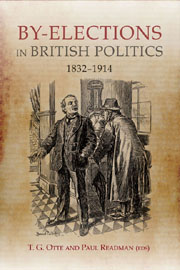Book contents
- Frontmatter
- Contents
- List of Figures and Tables
- List of Contributors
- Preface and Acknowledgements
- List of Abbreviations
- Introduction
- 1 ‘Plumping Contests’: The Impact of By-elections on English Voting Behaviour, 1790–1868
- 2 Government Appointment By-elections: 1832–86
- 3 ‘We should have had 1,000’: The By-elections of the 1874 Parliament
- 4 ‘The Glamour of Independence’: By-elections and Radicalism during the Liberal Meridian, 1869–83
- 5 ‘The Swing of the Pendulum at Home’: By-elections and Foreign Policy, 1865–1914
- 6 By-elections and the Modernisation of Party Organisation, 1867–1914
- 7 ‘A Terrific Outburst of Political Meteorology’: By-elections and the Unionist Electoral Ascendancy in Late-Victorian England
- 8 Land Reform and By-elections, 1885–1914: Do By-elections Matter?
- 9 Edwardian By-elections
- 10 Lloyd George, Limehouse and the Realignment of British Politics: The Bermondsey By-election of 1909
- 11 By-elections and the Peculiarities of Scottish Politics, 1832–1900
- Index of By-election Contests
- General Index
7 - ‘A Terrific Outburst of Political Meteorology’: By-elections and the Unionist Electoral Ascendancy in Late-Victorian England
Published online by Cambridge University Press: 05 May 2013
- Frontmatter
- Contents
- List of Figures and Tables
- List of Contributors
- Preface and Acknowledgements
- List of Abbreviations
- Introduction
- 1 ‘Plumping Contests’: The Impact of By-elections on English Voting Behaviour, 1790–1868
- 2 Government Appointment By-elections: 1832–86
- 3 ‘We should have had 1,000’: The By-elections of the 1874 Parliament
- 4 ‘The Glamour of Independence’: By-elections and Radicalism during the Liberal Meridian, 1869–83
- 5 ‘The Swing of the Pendulum at Home’: By-elections and Foreign Policy, 1865–1914
- 6 By-elections and the Modernisation of Party Organisation, 1867–1914
- 7 ‘A Terrific Outburst of Political Meteorology’: By-elections and the Unionist Electoral Ascendancy in Late-Victorian England
- 8 Land Reform and By-elections, 1885–1914: Do By-elections Matter?
- 9 Edwardian By-elections
- 10 Lloyd George, Limehouse and the Realignment of British Politics: The Bermondsey By-election of 1909
- 11 By-elections and the Peculiarities of Scottish Politics, 1832–1900
- Index of By-election Contests
- General Index
Summary
From the 1880s by-elections began to attract a level of attention that was unprecedented, from politicians and public alike. Reflecting on the by-elections which had taken place during the earlier part of the 1886–92 Salisbury government, Gladstone observed how ‘they have kept the nation in an almost perpetual fever: the figures of the polls have flown on the wings of the telegraph into every quarter, and have been minutely discussed by the metropolitan and provincial press’. By-elections even began to attract regular notice and comment in the satirical press from the 1880s with candidates-aspirant succumbing to the wit and acerbity of Punch and Judy. We know from political diaries that by-election strategy and results were discussed by the party leadership and in Cabinet. The moods of governments and oppositions rose and fell with these contests. The victors would exaggerate the significance of their gain while the losers consoled themselves by minimising the significance of their loss – at least in public – a ritual that moved Punch to ask: ‘Know you not that nothing … is so mad and so maddening as a Tory article on a bye-election won by a Liberal, or a Liberal article on a bye-election won by a Tory?’
By the late 1880s there was no such thing as a local parliamentary by-election. One of the more novel features of elections since 1885 was the tendency, to quote Henry Jephson, ‘to magnify each local struggle into a combat decisive ofthe Empire's fate’. As other chapters in this volume testify, by-elections could attract national attention before the 1880s but it was not on the same scale.
- Type
- Chapter
- Information
- By-Elections in British Politics, 1832-1914 , pp. 177 - 200Publisher: Boydell & BrewerPrint publication year: 2013



